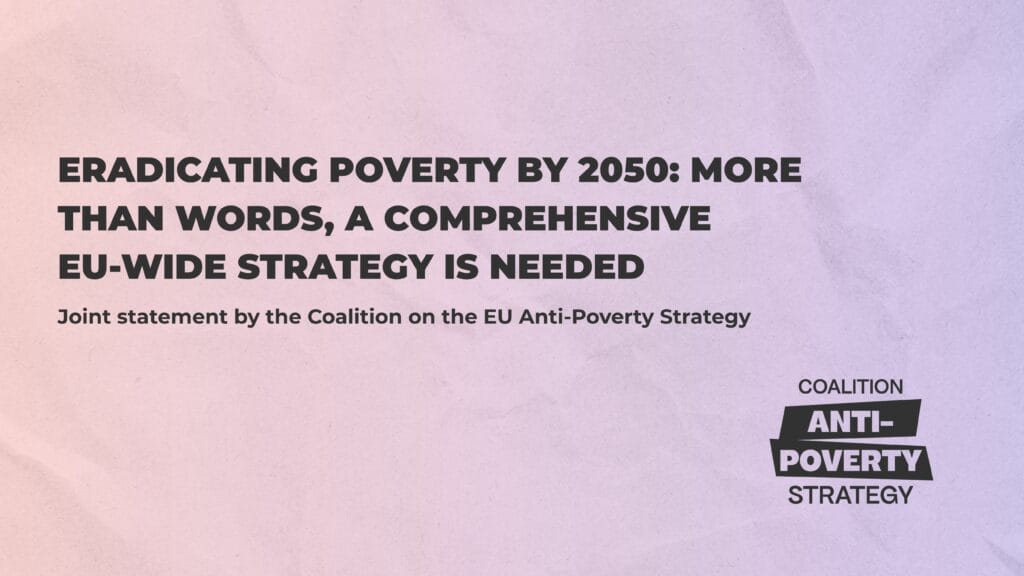Eradicating Poverty by 2050: More Than Words, a Comprehensive EU-Wide Strategy Is Needed Joint statement by the Coalition on the EU Anti-Poverty Strategy

21 October 2025
On 10 September 2025, Ursula von der Leyen, the President of the European Commission, committed in her State of the Union address to eradicating poverty in the EU by 2050. A strong, ambitious, and properly resourced EU Anti-Poverty Strategy is central to achieving this goal. Yet, the narrow focus of current discussions on employability could mean that the Strategy ends up leaving many behind. As the consultation process unfolds, the EU Coalition on the EU Anti-Poverty Strategy calls for an urgent, comprehensive, and inclusive approach that truly reflects the scale of the challenge.
In 2026, the European Commission will launch the EU Anti-Poverty Strategy, the first of its kind in the European Union (EU). For the Coalition’s members, which represent organisations working directly with people experiencing poverty across diverse marginalised communities and social service providers supporting these groups, the strategy is the fulfilment of a long-standing demand.
The Strategy comes at a time of increasing hardship and exclusion. Today, at least 21% of the population and 24% of children in the EU are at risk of poverty or social exclusion, although some groups who are at especially high risk of poverty, like homeless and undocumented people, do not even make the statistics. Many people in poverty face persistent barriers when accessing support, including social protection, rights and essential services.
That is why the Coalition calls for a strong, comprehensive, and human rights-based approach to the EU Anti-Poverty Strategy.
However, so far, the European Commission’s current consultation processes fail to explore the systemic root causes of poverty and continue to focus too narrowly on the shortcomings of income and lack of access to employment, treating symptoms rather than causes, and leaving little space to provide feedback and expertise on the complexity and multidimensionality of poverty.
This is even more concerning in a context where security, defence, and competitiveness continue to dominate the EU agenda, pushing social policy priorities aside.
The Coalition believes the EU Anti-Poverty Strategy must:
- Address the structural and systemic root causes of poverty, including the unequal distribution of resources, intergenerational poverty, discrimination, undemocratic processes, inadequate social protection, and lack of access to rights, resources, and essential services;
- Recognise that the intersectional aspects of poverty are the results of multiple forms of discrimination and exclusion based on, among others, gender, socio-economic background, ethnicity and race, residence status, religion and belief, disability, age and sexual orientation, and family status;
- Adopt an intergenerational lens – to effectively address poverty and social exclusion, policies must adopt a family-centred lens, recognising households as interdependent systems where vulnerabilities intersect and compound across generations. A narrow focus on individuals risks obscuring the relational dynamics of poverty.
- Support all people experiencing poverty in the EU, regardless of nationality or residence status, including people in the most vulnerable situations, such as those experiencing homelessness;
- Include immediate and well-funded actions to alleviate poverty for those already affected, including through adequate social benefits, minimum income schemes and pensions, ensuring all people can live in dignity;
- Ensure coherence with other EU frameworks, including the renewed European Pillar of Social Rights Action Plan, the European Child Guarantee, the Union of Equality, the European Semester, and related economic, digital, climate, fiscal, migration, and public procurement policies.
The Strategy must also be underpinned by:
- The meaningful participation of impacted communities at every stage of policy design, implementation, and monitoring.
- Adequate resources, including through the Multiannual Financial Framework (MFF). However, the recently launched MFF 2028–2035 proposal risks prioritising competitiveness, defence, and security at the expense of people in marginalised and vulnerable situations.
- Strong coordination mechanisms at the EU level overseeing the implementation and evaluation of the Strategy, underpinned by adequate data collection capacities within Member States, including disaggregated data by multiple grounds, including racial and ethnic background, at national and regional levels.
- Ambitious targets and indicators shaped with the involvement of people experiencing poverty.
- Multi-level commitments, by requiring Member States to develop national and local anti-poverty strategies.
Poverty eradication by 2050 must move beyond a distant promise to become a measurable and collective project, driving all relevant EU policies and priorities. A truly comprehensive EU Anti-Poverty Strategy will send a powerful signal that the Union stands for dignity, equality, and social justice for all. This is the only way to ensure that the EU lives up to its values and creates a future in which no one is left behind.
Statement endorsed by the following members of the Coalition on the EU Anti-Poverty Strategy:
AGE Platform Europe
ATD Fourth World
Caritas Europa
COFACE Families Europe
Emmaus Europe
ENAR
European Anti-Poverty Network
Eurochild
Eurodiaconia
European Roma Grassroots Organisations (ERGO) Network
FEANTSA
PICUM
Save the Children
SMEs-Europa
Social Platform
